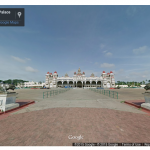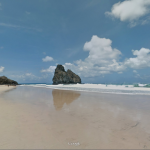13 instances of adware detected in Google Play store

Despite the recent announcement by Google that it has introduced a vetting process on the Play store it seems that there are still rogue apps to be found.
Mobile security company Lookout has uncovered 13 apps with adware. Worse still these display malware-like characteristics that make them hard to remove. The company has alerted Google to the apps and they've already been removed from the store.
Google Maps heads to India on a sightseeing tour

The Google Maps team seems to always be on the move, one location to the next, in an attempt to capture images of the world around us. Just yesterday the trekkers were in South America bringing us images of the little-seen islands off the coast of Brazil. Now the team is in India, not for the first time, to show off the nation's treasures.
We've already seen the Taj Mahal, but now you will get a glimpse of the many other wonders that exist in the nation. Google claims that "we’ve partnered with the Archaeological Survey of India (ASI) and other institutions to bring a comprehensive range of India’s heritage sites online, including national icons like the Taj Mahal, Safdarjung Tomb, and the Ellora Caves".
Google starts vetting Android apps and implements age rating system

For a long time now Google Play has been home to just about any sort of app imaginable. Apps covering every subject under the sun are available, with quality ranging from atrocious to incredible. To help sort the wheat from the chaff, Google has announced two important changes to the way apps appear in the store.
Apps that are submitted to Goole Play are now subject to a review process, and an age rating system is being introduced to help indicate the target audience for apps. Google says this will help to weed out "violations of our developer policies earlier in the app lifecycle".
What do you want in a mobile operating system?

I'm not going to open the 'which mobile operating system is best' can of worms -- let's get that clear from the offset. This is not me trying to push my preferred operating system on you, or trying to convince you that you're wrong about the OS you've opted for. This time it's over to you. What you do want?
Do you want things handed to you on a plate, or would you prefer to be granted more control over the operating system on your phone and tablet? Is there mobile platform that meets your needs at the moment, or would you like to combine elements from Android, iOS, Windows Phone and even BlackBerry OS? Just what is it that makes the perfect operating system for your phone or tablet?
Google Maps discovers the Brazilian islands

The Google Maps team is at it again, trekking the world to bring images to its users, going around cities, down trails and into the oceans. This time the target is the islands of Brazil, which are seldom seen, even by tourists. These are the dots of land known as Fernando de Noronha and Atol das Rocas, which lay just off the coast. According to Wikipedia, they are "an archipelago of 21 islands and islets in the Atlantic Ocean, 354 km (220 mi) offshore from the Brazilian coast".
This is more than just beautiful tropical island landscapes, the Google crew also went beneath the waves for more images. You'll get to see the dolphins swim and even a grab a rare glimpse of sea turtles in their natural environment.
Be a cloud storage tycoon with Google Nearline

If you have an entrepreneurial bent it’s hard not to see an opportunity to start the next big cloud storage company in last week’s Nearline Storage announcement by Google. I saw it immediately. So did Google make a big pricing mistake? Probably not.
Nearline storage usually means files stored on tapes in automated libraries. You ask for the file and a robot arm loads the tape giving you access to your data in a couple minutes. Google’s version of nearline storage is way faster, promising file access in three seconds or less. It doesn't say how it works but it makes sense to imagine the data is stored on disks that are powered-down to save energy. When you ask for the file they spin-up the disk and give it to you.
Geeky students, act fast -- Google accepting applications for Summer of Code 2015

Geeky students have it made nowadays. You see, there are many outlets for their minds to be put into use. Sadly, before the Internet, it could be difficult for like-minded tech geeks to communicate and collaborate. Quite frankly, a curious mind could go undernourished as a result.
One of the coolest programs for tech-focused students is the Google Summer of Code. Why? For one, it is run by Google, so it is well funded and organized. More importantly, however, is that all of the projects in the program are open source. Today, the search giant begins taking applications. With that said, the window to apply is fairly small, so you had better do it soon.
13 things you should know about Chromebook Pixel 2015
The second of three Friday 13ths was definitely a lucky day. Near Noon, FedEx delivered the Chromebox Pixel 2015, which I set up late afternoon. Nearly 24 hours later, time is right for some immediate reactions before my eventual full review. My perspective presented here is two-fold: General first impressions for anyone combined with what are the benefits for existing Pixel owners. For many of the latter group, I say this: Consider your budget and needs wisely. What you've got may be more than good enough.
For everyone else, I will contradict the majority of reviewers, and even Google. Pixel is not a computer for developers or limited number of laptop users. Anyone shopping for a quality notebook that will last years should consider the new Chromebook, most certainly if looking at any MacBook model or Windows PC, such as Surface Pro 3. Everyone living the Google lifestyle who can afford a laptop in this price range should consider nothing else. Now let's get to the drill down, point by point. There are 13, for no other reason than my receiving the laptop on the unluckiest day.
Nope, Microsoft isn't getting into Android with a Cyanogen investment

A little while back rumors surfaced suggesting that Microsoft was on the verge of investing in Android. Not directly, you understand, but via Cyanogen Inc. In August, Cyanogen Inc met with Satya Nadella but it seems that the talks amounted to nothing.
The company is on the verge of raising $110 million of financing, but Microsoft will not be involved. According to a report by Bloomberg, Microsoft will not be contributing to the funding, but could still be interested in perusing commercial ventures with Cyanogen Inc to help push Microsoft apps onto more Android devices.
LaCie unveils USB Type-C Porsche Design HDD for ChromeBook Pixel and MacBook

Apple seems to be getting a lot of credit for the USB Type-C frenzy, but this is very misplaced. You see, the Chromebook Pixel -- with two of the ports -- was in the hands of reviewers weeks before the new MacBook (with its one measly port) was announced. Before the Pixel, however, Type-C was already long in development. Hell, BetaNews covered an MSI motherboard with the connector in January; months before Apple announced its $1,300 OS X netbook laptop. No individual company -- not Google, Apple nor MSI -- should get sole credit. The USB consortium got it standardized and ultimately approved in August of 2014.
Expect to see a lot of USB Type-C products in 2015 as there is a scramble to capitalize on early-adopters. LaCie is one of the first companies to have an honest to goodness product with the connector. Besides having the new connector, it is sexy and well-designed (as are all products in the Porsche Design line). However, is it necessary?
YouTube adds support for interactive 360-degree video uploads

If you've splashed out on a fancy 360-degree camera, you can now use YouTube as a platform to show off your footage. It's something that Google promised back at the start of the year, and it has finally come to fruition. Rather than restricting viewers to watching the action that's happening in one direction, these immersive video allow you to look around in every direction as if you were there.
There are already a number of videos online to check out, and it’s a method of recording that lend itself perfectly to concerts, sporting events and the like. 360-degree videos are best enjoyed through virtual reality headset, but desktop and mobile users have not been forgotten.
Time to migrate to GitHub as Google Code closes

After nine years, Google Code is closing down. Starting today, it is no longer possible to create new projects, and over the course of the coming ten months, the service will be mothballed. Google Code was Google's attempt to help the open source community by offering somewhere to host projects, but the growth of the likes of GitHub and Bitbucket has taken its toll and Google Code has filled up with spam and abuse.
Competition in the world of project hosting has become fierce, and Google feels it's time to pass on the baton rather than fighting for attention. Google has itself moved many of its own open source projects to GitHub. Don't panic if you’re not quite ready to jump ship -- there's still a little time to play with.
Did Google taint 12-inch MacBook news coverage?

Bias in the media is inevitable, and any news gatherer who denies this fact is a liar. Companies seek favor or to influence in countless ways. It's the nature of the beast, which cannot be tamed. So I wonder how Chromebook Pixel embargoes impacted reporting about Apple's newest laptop. If so, Google pulled off one hell of a marketing coup.
The search and information giant provided many tech blogs and news sites with the new Pixel about a week before the laptop launched yesterday and the first reviews posted—that was also days before Apple's well-publicized media event where a new MacBook was rumored. Both computers share something in common: USB Type-C, which is bleeding-edge tech. The connector received much media attention on Monday and Tuesday two ways: Buzz about it being the next great thing, and MacBook having but one port (Pixel has two, and others).
Bidding farewell to Google's Nexus 5

When looking for an affordable high-end smartphone the other day Google's Nexus 5 was an obvious option. Even one and a half years after its launch, its hardware is still more than capable of running all the latest apps and games, while the camera can still be considered a decent shooter. The downside of going with Nexus 5 -- as with previous Nexus smartphones -- is battery life, which falls short of the competition. So I ended up getting something else.
It turned out to be a smart move, as Google just pulled Nexus 5 from its online store, after five months of coexisting with its latest flagship smartphone, Nexus 6. If you still want to get one then you will have to look at retailers and some carriers, which are likely to carry Nexus 5 for at least a few more months (until LG stops production and/or existing stock is depleted.)
Reporters Without Borders unblocks access to censored websites

Online censorship is rife. In many countries, notably China, citizens are prevented from accessing certain websites at the behest of their government. To help provide access to information and unbiased news, freedom of information organization Reporters Without Borders has set up mirrors to nine censored websites so they can be accessed from 11 countries that blocked them.
As part of Operation Collateral Freedom, Reporters Without Borders is mirroring the likes of The Tibet Post International which is blocked in China, and Gooya News which is blocked in Iran. Mirrored sites are hosted on Amazon, Microsoft and Google servers which are unlikely to be blocked by a censoring country.
Recent Headlines
BetaNews, your source for breaking tech news, reviews, and in-depth reporting since 1998.
© 1998-2025 BetaNews, Inc. All Rights Reserved. About Us - Privacy Policy - Cookie Policy - Sitemap.